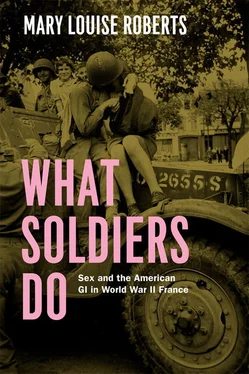The results of the bombing were personally devastating. “Our faces were lit by flame light,” remembered Antoine Anne, “you could see the fear, emotion, and horror inscribed upon them. Facing the inferno, we became all too aware of those buried under the flames. A crushing silence fell upon us.” He had lost his entire family except the child he held in his arms. 47Countless other children witnessed death for the first time. Twelve-year-old Robert Simon, for example, watched a close friend die, then greeted the Americans with “an inner wound and a heavy heart.” 48As thousands of Normans found themselves homeless, they took to the road, seeking out family and shelter in distant villages. The constant walking was hard on the legs and feet, particularly those of the elderly and children. When some weeks later they returned, everything was gone. “My house, my childhood, nothing. There was nothing left,” remembered Madame Dold-Lomet about her homecoming in Saint-Malo. 49Of Saint-Lô, Jacques Petit wrote in his journal: “my town no longer exists. How many weeks of madness were necessary to wipe all traces of my childhood? How can I possibly find them again?” 50
Saint-Lô, in particular, became a “martyred village,” its churches “murdered” and “amputated.” 51Civil Affairs reported “embittered” complaints from refugees declaring the bombing “excessive.” 52“All was macabre desolation,” remembered one Civil Affairs officer of Saint-Lô. He wondered, “how could a city so shattered ever survive?” 53“The city looked as though it had been pulled up by its roots, put through a giant mixmaster then dumped back out again,” remembered Frank Freese. 54“The desperate despair of destruction” was how Chester Hansen, aid to Omar Bradley, described it. 55“Mounting ruins on a cracked, punctured, blistered terrain”—this is what one young Norman saw when he emerged from a shelter. 56Refugees going through on their way home described the city as wrapped in “a silence of death.” 57“We go through Saint-Lô in a deathly silence,” wrote one Norman in his diary. “The town is nothing but an enormous field of ruins, without a soul.” 58American radio operator Sim Copans had the same response: “There was absolutely nobody in the streets, and the atmosphere was eerie. …It was really a horrifying sight.” 59When résistante Lucie Aubrac returned to France after the Liberation, she also traveled through the town. “I had no fear at any moment,” she later remembered, “except perhaps at Saint-Lô. The town had been terribly bombed by the Allies. The houses collapsed like paper cartons! It was spectacular and frightening.” 60
Even in towns less damaged, the war left its mark. “Think of taking a drive on a maze of narrow country roads,” urged reporter Andy Rooney, “where every farmhouse is an armed fortress, every church steeple a sniper’s observation post, every stone wall conceals infantry with rifles and machine guns, and where, at every curve in a road, there may be a tank with an 88mm gun trained on the curve you’re coming around. That’s the way it was in Normandy in June and July of 1944.” 61Overnight Normandy had become a war zone. Booby traps transformed the famous hedgerows into deadly weapons. Fine wires lay across roads to trigger explosions. Apple orchards harbored German mortar stations. Barns hid German artillery. 62Knowing that the GIs were souvenir hunters, the Nazis also left behind military paraphernalia rigged with explosives. When Raymond Avignon picked up a German helmet, an American soldier saved his life by making him put it down, showing him an iron thread that would trigger an explosion, then removing it with “meticulous” care. 63
The effect of this transformation was to deliver up the uncanny—to render the known unknown. “Familiar places appeared unrecognizable,” noted Charles Lemeland, then twelve. “It seemed there was now something horrible and monstrous hiding there. The endless road, bordered by houses and farms, was absolutely deserted except for dead animals—a German shepherd and a pig side by side—and a few dead men.” After the front moved on, “spread over miles was simple ordinary war garbage,” he continued “clothing, food, ammunition—an immense yard sale gone crazy.” 64The task of removing debris, filling holes, and restoring a countryside “sterilized by the passage and mechanisms of war,” as one journalist put it, seemed overwhelming. 65Even in December 1944, with the front now hundreds of miles away, Normans were still reeling from the devastation. A Caen editorial declared it “the saddest Christmas we have ever known. Because we still live in a world in flames, in a murdered France, in a ravaged region. No more houses, no more roofs over our head, and grief everywhere around us.” 66On the eighth of June 1945, the same paper remembered D-day as “so beautiful and yet so cruel.” 67
The destruction would have been easier on the Normans if their victory had been assured. Part of Norman anguish in the early weeks of the campaign resulted from the uncertainty of the battle’s outcome. During the very hard fighting on the Cotentin Peninsula in June and early July, villages in the region between Cherbourg and Caen were passed back and forth between German and Allied control. 68At times the Americans were forced to retreat from villages they held, so that Normans would taste freedom only with a bitter flavor. The mayor of Sainte-Mère-Église reported to his superior that on D-day, when US military reinforcements did not arrive, “the women cried and begged: ‘do not abandon us!’” The Americans reassured them “we will never abandon you, we will die on this spot.” 69According to the first US military report on the local Norman population, civilians “could not be certain that we would be able to hold our ground. They do doubt, though, of denunciations, arrests, etc. should we move out.” 70
Even after civilians were reassured that freedom—and the Americans—were there to stay, shock took a huge toll on the population. “Men and women everywhere stood crying and rocking back and forth as though in prayer,” recalled John Hurkala. “Obviously they were wondering whether or not everything had taken place was true. It was.” 71In the faces of civilians returning to Caen, journalist Jacques Kayser saw “eyes overflowing with anguish and visions of horror, but also eyes that know how to say ‘thank you.’” 72“Every family had lost someone,” recalled Andy Rooney. “It was true that they were being freed but at the cost of the total destruction of everything they had.” 73In Valognes, Guillaume Lecadet remembered how when the Americans appeared, “there was a little enthusiasm, but alas, a screen of terrible visions stood between us and joy.” 74The liberated also worried about loved ones caught up elsewhere in the chaos of battle. 75After the Americans passed through his village, Jean-Pierre Launey remembered “a strange feeling invaded my spirit. We were liberated but the war was not over.” 76
Far from being blind to Norman suffering, the GIs were angered, shocked, and saddened by the effects of bombardment. Due to censorship, news of the destruction had not reached home. In November, for example, Life magazine refused to publish parts of a report from France that referred to “all these deaths, all these villages destroyed” by Allied bombers. 77After American pilot Henry Hodulik jumped from his plane to safety with a Norman family near Rouen, he was horrified by the extent of nearby bombing. As his French keepers remembered, “he was ready to leave, to try and cross the line and tell Allied troops, ‘You’re crazy! You’ve bombed Neufchâtel. Where’s the military objective?’” 78“I must say, I feel sorry for the French,” wrote Morton Eustis to his mother. “In order to get back their freedom, they have to see their country ravaged all over again from another direction.” 79Robert Easton imagined that Normans at Saint-Lô reasoned in the following way: “When the Germans were here they did not trouble us greatly; at least they left us our homes. Now the Americans have left nothing.” 80“It gave me a curious, displaced feeling to look at the damage that can be done,” noted Jan Giles about the bombing. He was particularly saddened by the destruction of the beautiful cathedral at Carentan. 81
Читать дальше












